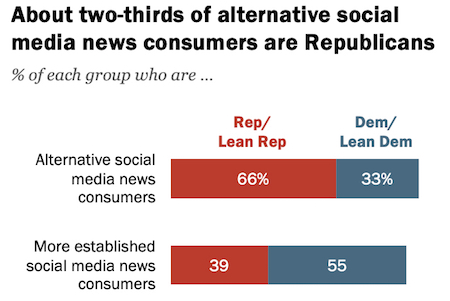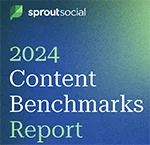For the past several years, a spate of alternative social media sites—Truth Social, Telegram and Gab, among others—have cropped up to great fanfare among a small but loyal community of news consumers seeking refuge from established social sites such as Facebook, Twitter and YouTube.
According to a new Pew Research Center study, most consumers who turn to these sites do so to find a sense of community and to stay informed on current events. But much of the news media content flowing on these platforms raises questions regarding the credibility of the information found there, as well as whether it’s contributing to Americans’ increasing partisan divisions and polarized public discourse.
The study, which was conducted to analyze the world of alternative social media, found that relatively few Americans (only about six percent) regularly get their news from these sites. And among those who do, no single site is used for news by more than two percent of U.S. adults.
Despite their relative unpopularity, however, about two-thirds (65 percent) of those who rely on these sites for news said they feel a sense of community with like-minded people on these forums. Nearly a quarter (22 percent) said they view these sites as havens for free speech and an anti-censorship alternative to more established social media platforms.
 |
| While only about six percent of Americans get their news from ‘alternative’ social media sites, about two-thirds of those who do identify as conservative. |
A majority of those who use these sites (56 percent) say they do so to stay informed on current events and issues. And more than half of them (52 percent) claim that the news they come across on these networks is content they wouldn’t have encountered elsewhere.
These communities overwhelmingly lean conservative: two-thirds of respondents (66 percent) who said they regularly get their news from these sites identify as Republican or Republican-leaning. By contrast, a majority (55 percent) of those who get their news on more established social media sites identify as Democrat or Democratic-leaning. A third (33 percent) of alternative social media news consumers also claim they’ve participated in in-person political rallies and 36 percent said they’ve donated money to accounts they follow on these sites.
Pew’s analysis additionally found that more than half (54 percent) of the accounts on these sites appeal to some kind of political value or political orientation, with roughly a quarter (26 percent) expressing a right-leaning political orientation or support for former President Donald Trump. The study also discovered that six percent of prominent accounts on the site have a connection to the far-right QAnon conspiracy.
Perhaps the most telling detail: the Pew survey found that, unlike mainstream social media platforms, a majority of the news links contained on these sites (45 percent) come from other social media sites as opposed to legacy news organizations, which account for only four percent of news content.
The study also found that 15 percent of the most prominent accounts on these sites are from public figures who have been banned elsewhere—such as Trump—mostly due to spreading misinformation.
Finally, despite these sites’ claims of being vanguards of free speech, the study discovered that most “alternative” social sites still moderate content to some degree and also give their users the ability to do the same. Much of this moderation includes removing posts that may contain violent, racist or offensive content, though the Pew study discovered that some of the content deleted was done so due to the political views expressed.
Pew’s study surveyed more than 10,000 U.S. adults in May using the Center’s American Trends Panel, a nationally representative list of randomly selected respondents. The study also included an April audit of seven alternative social media sites: BitChute, Gab, Gettr, Parler, Rumble, Telegram and Truth Social.


 What if companies could harness the fury of online outrage into a force for good? This is precisely where companies can start turning the trolls into brand champions.
What if companies could harness the fury of online outrage into a force for good? This is precisely where companies can start turning the trolls into brand champions. Audiences interacted with brand content far more often on Facebook and Instagram in 2023 than they did via X (formerly Twitter), according to a report that tracked engagement trends across different social networks.
Audiences interacted with brand content far more often on Facebook and Instagram in 2023 than they did via X (formerly Twitter), according to a report that tracked engagement trends across different social networks. Can public relations help counteract the dissension fostered by the power of digital platforms to spread hate, fear and confusion?
Can public relations help counteract the dissension fostered by the power of digital platforms to spread hate, fear and confusion? The number of Americans who get their news from TikTok has quadrupled in the last three years, according to a recent Pew Research Center report.
The number of Americans who get their news from TikTok has quadrupled in the last three years, according to a recent Pew Research Center report.


 Have a comment? Send it to
Have a comment? Send it to 
Oct. 10, 2022, by Joe Honick
The studies of the roots of critical thinking or the lack thereof are extremely important, but the report does not go far enough, certainly not as far as a heap of extremist right wing media that exist daily and are heavily financed. Just as interestingly, almost all of the ones I will mention seem to have the same "stable" of advertisers (sponsors), and humorously or suspiciously including even Elon Musk who is peddling an auto gadget.
Almost none will tell inquirers who their editors and staff are but all fling daily filth at the Biden administration in ways that would have been labeled as socialist, communist or worse had the same copy been used against Republicans.
They are heavily backed by almost hourly radio commentary from Sean Hannity and a well financed operation that used to be jointly operated by Tucker Carlson and is now called Tucker Daily with no interest in reader responses.
We must believe that much of the reported disinformation reviewed by Pew and others is planted and "fertilized" by these media many of us uncovered long before this survey report but given far too little coverage when the impact so vast and insistent.